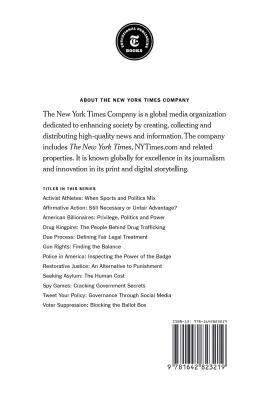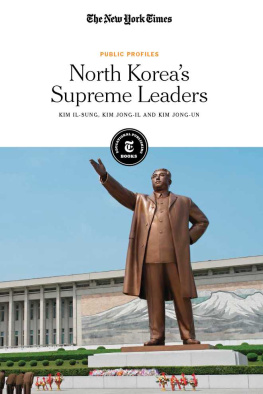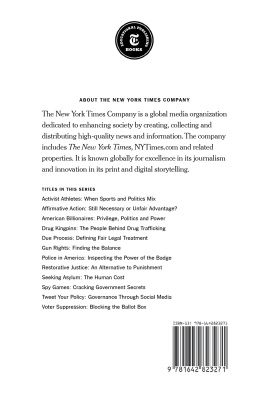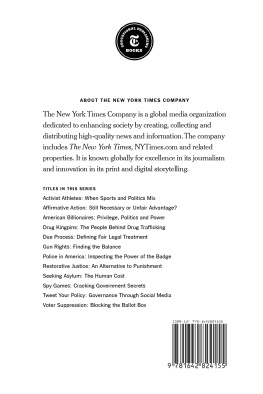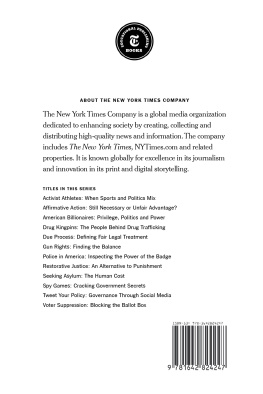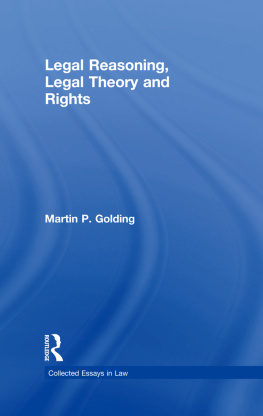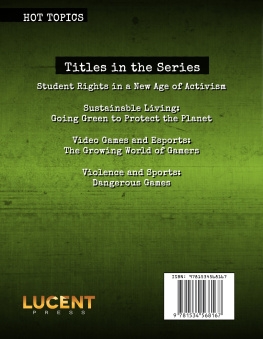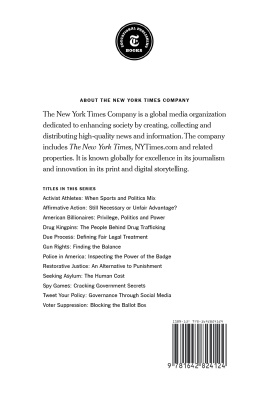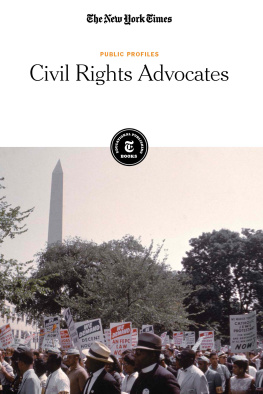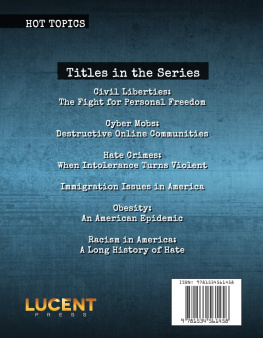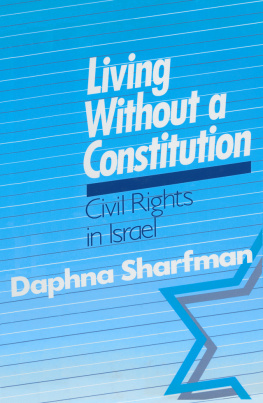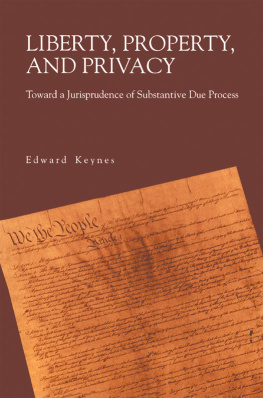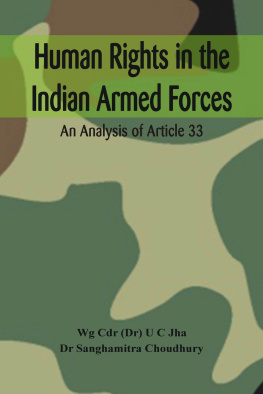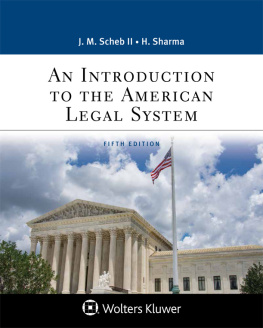
Published in 2021 by New York Times Educational Publishing in association with The Rosen Publishing Group, Inc.
29 East 21st Street, New York, NY 10010
Contains material from The New York Times and is reprinted by permission. Copyright 2021 The New York Times. All rights reserved.
Rosen Publishing materials copyright 2021 The Rosen
Publishing Group, Inc. All rights reserved. Distributed exclusively by Rosen Publishing.
First Edition
The New York Times
Caroline Que: Editorial Director, Book Development
Phyllis Collazo: Photo Rights/Permissions Editor
Heidi Giovine: Administrative Manager
Rosen Publishing
Megan Kellerman: Managing Editor
Meredith Day: Editor
Greg Tucker: Creative Director
Brian Garvey: Art Director
Cataloging-in-Publication Data
Names: New York Times Company.
Title: Due process: defining fair legal treatment / edited by the New York Times editorial staff.
Description: New York: New York Times Educational Publishing, 2021. | Series: In the headlines | Includes glossary and index. Identifiers: ISBN 9781642823219 (library bound) | ISBN 9781642823202 (pbk.) | ISBN 9781642823226 (ebook) Subjects: LCSH: United States. Constitution. 5th Amendment Juvenile literature. | United States. Constitution. 14th AmendmentJuvenile literature. | Due process of lawUnited StatesJuvenile literature. | Civil rightsUnited StatesJuvenile literature.
Classification: LCC KF4765.D847 2020 | DDC 347.73'5dc23
Manufactured in the United States of America
On the cover: The U.S. Supreme Court building in Washington, D.C.; Andrew Harrer/Bloomberg Creative Photos/Getty Images.
Contents
Introduction
CONSIDERED ONE OF the fundamental guarantees of individual rights in the U.S. Constitution, due process has evolved over the course of American history. It refers to a broad range of legal proceedings meant to protect the rights of individuals. The Fifth Amendment states, in part, that No person shall be deprived of life, liberty, or property, without due process of law. Similar phrasing appears again in the Constitution in the 14th Amendment, which states, in part, nor shall any state deprive any person of life, liberty, or property, without due process of law. The reference to any state could arguably be interpreted to mean that states were now subject to the same limitations as the federal government in other words, that states could not restrict individual rights in the Bill of Rights, such as an accused persons right to a speedy trial by jury. However, for decades after the 14th Amendments ratification in 1868, the Supreme Court continued to rule that the Bill of Rights applied only to the federal government.
Freedom of speech and freedom of the press (from the First Amendment) were the first protections from the Bill of Rights to be applied to the states, in a 1925 Supreme Court case. Over the next few decades, the Court slowly began to expand this incorporation of the Bill of Rights via the 14th Amendments due process guarantee. Many of these cases involved the rights of criminals to due process proceedings: Gideon v. Wainwright (1963) guaranteed a defendants right to an attorney, while Miranda v. Arizona (1966) protected a persons right to remain silent after being arrested, introducing the now-well-known concept of Miranda rights. In February 2019, the Court ruled that the Eighth Amendments protection against excessive fines applied to the states, one of the few criminal-trial protections that had not yet been incorporated.
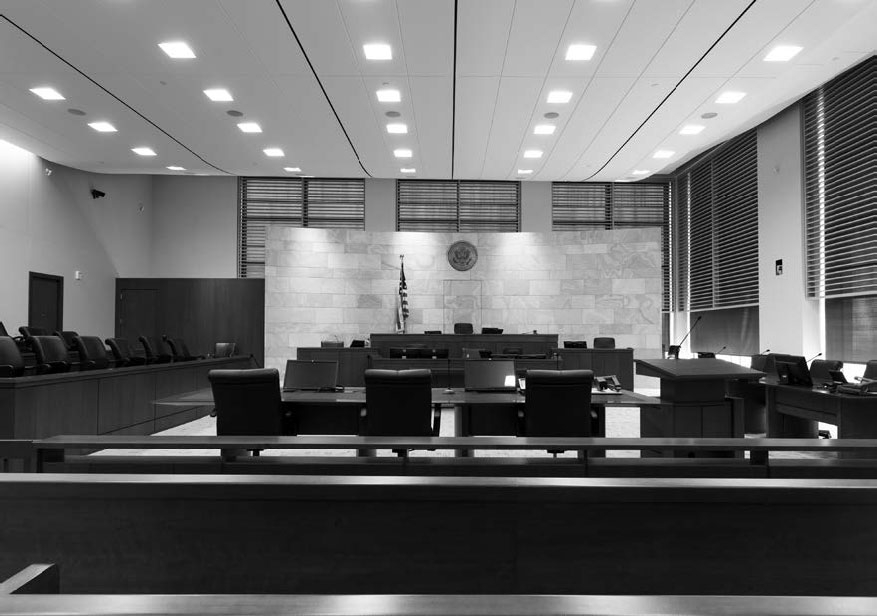
LIBRARY OF CONGRESS PRINTS AND PHOTOGRAPHS DIVISION
Courts at every level of jurisdiction in the United States hear cases related to due process. A U.S. district court, like this one in Cedar Rapids, Iowa, is the lowest level of federal court. Cases from it may be appealed to the circuit court and, occasionally, up to the Supreme Court.
In addition to a persons rights in civil and criminal legal proceedings, due process is also invoked in regard to the constitutionality of economic or social welfare legislation. In the early 20th century, courts routinely struck down economic regulations such as a minimum wage or a maximum number of hours that can be worked. The rationale was that such regulations restricted a persons freedom of contract, which would fall under the category of liberty one of the fundamental rights that could not be abridged without due process of law under the Fifth Amendment. The Supreme Court began to uphold this sort of economic legislation beginning in the late 1930s, but the concept of liberty, this time as it related to privacy, was the basis of the landmark abortion case Roe v. Wade in 1973.
The meaning of due process, and to whom it applies, has implications for a broad range of issues that continue to confound and divide both judges and the court of public opinion. National security concerns can interfere with due process, such as in 2010 when the administration of President Barack Obama authorized the killing of Anwar al-Awlaki, a terrorist suspect who was an American citizen. Many legal experts argued that Awlakis American citizenship entitled him to a fair trial and that killing him was thus illegal. In 2018, President Donald Trump advocated that undocumented immigrants at the U.S. border with Mexico should be deported without any kind of hearing, a position that was inconsistent with previous court rulings that stated anyone who set foot on American soil should have the right to due process. Meanwhile, beginning in the fall of 2017, the #MeToo movement sparked a wave of accusations of sexual harassment and sexual assault and also concerns that the accused, from prominent national figures to college students, faced unfair consequences in the public eye before they were able to defend themselves in a court of law.
These conflicts demonstrate the ongoing push and pull that due process exerts on American law and society. The articles in this book trace the history of due process from the early 20th century to the present.
CHAPTER 1
Due Process in the Early 20 th Century
In the early decades of the 20th century, lawyers and judges grappled with the meaning of due process in terms of both criminal procedure and economic policy. An example of the former that captured the nations attention was the case of Leo M. Frank, accused of murdering a woman in Atlanta in 1915. He was eventually executed, despite an appeal on the grounds that his absence from the courtroom when the verdict was announced was a violation of his due process rights. On the other hand, through the late 1930s, courts routinely struck down economic regulatory laws, arguing that they restricted a persons liberty without due process of law.
Judge Parker Speaks
BY THE NEW YORK TIMES | JULY 4, 1903
The judge addresses the Georgia Bar Association on Due Process of Law and says the Fourteenth Amendment is better left to courts than to the president and Congress.
TALLULAH FALLS, GA., JULY 3.The members of the Georgia State Bar Association this morning listened to an address on Due Process of Law, by Chief Judge Alton B. Parker of the New York State Court of Appeals. In conclusion he referred to the Fourteenth Amendment as follows: More and more every year is due process of law invoked, by reason of its place in the Fourteenth Amendment, to challenge the action of State Governments, and the time cannot be predicted when such efforts will cease.
It may be safely asserted that the restraining power of the Fourteenth Amendment as against the States will be exercised far more conservatively by that court of which every citizen is justly proud, than it would be were the exercise of it confided to the other departments of the National Government.
Next page
